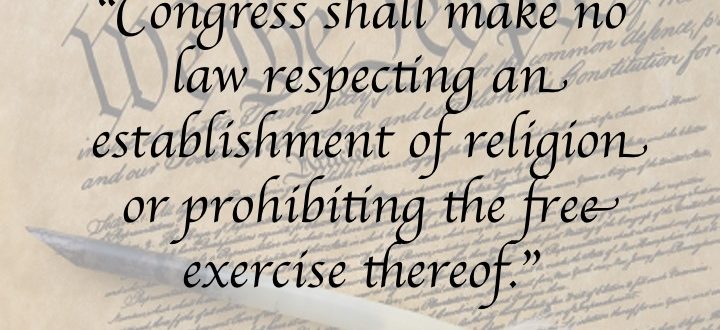A Statement on the “Establishment Clause” of the First Amendment
The Establishment Clause, along with the “Free Exercise” Clause, are the bases for the mission of Jews for a Secular Democracy. It is important to understand that the Establishment Clause does not just say that “Congress shall make no law establishing a [state/national] religion”, although its meaning clearly includes that. It says instead that “Congress shall make no law RESPECTING an establishment of religion”. That is a much broader statement than if it had said “Congress shall not establish a national religion”.
The meaning of the Establishment Clause is that Congress shall not pass laws that even HAVE TO DO WITH –“respecting” — establishing a religion — that even approach establishing or choosing or favoring a religion. It seems clear that the Founders chose this wording to underline that the government must keep its distance from engagement in religion — a hands-off approach to religion altogether. (There can be no privileging of any one religion over another whatsoever.) The fact of this broad wording is critical to understanding the full import of the Establishment Clause, and therefore the entire First Amendment.
The “Free Exercise Clause” — “Congress shall make no law …. prohibiting the free exercise [of religion]” — of course further underlines this hands-off approach regarding religion by government.
Add a lot of case law that has developed over the years, and it is clear too that the word “religion” also encompasses “belief” more generally. This is reinforced by the fact that the “Freedom of Speech” clause grants citizens the right to freely express what they believe.
So, the fact that the majority in this country are Christian has nothing at all to do, for example, with whether it is right to have prayer in public schools, or the Ten Commandments on court houses. The exceptionally clear — indeed, emphasized — meaning of the First Amendment to our nation’s Founding Document is that the entire governance sector of our country is indeed walled off from all things religious, meaning that they are intended to be and must remain, secular. Therefore, schools that are public — managed by local and state governments that are also Constitutionally secular — cannot favor one religion or group of religions, either. The wrongness of the Ten Commandments on court houses that are even more directly involved in governance, should go without saying.
Be wary, however, of those who will argue that our pointing out the unconstitutional nature of public school prayer or posting the Ten Commandments in public spaces, is disadvantaging Christianity. It has absolutely nothing to do with any kind of a prejudice against religion; it has everything to do with avoiding favoring one religion or belief over another.
1 Response
Leave a Reply
You must be logged in to post a comment.


Pingback : Religion and The Law – My Alter Ego, Layla